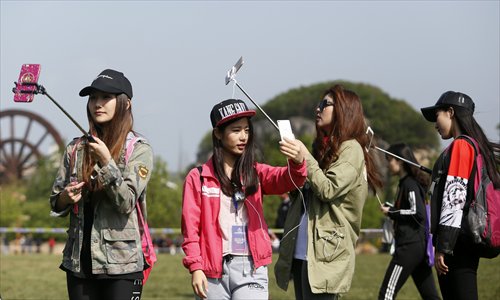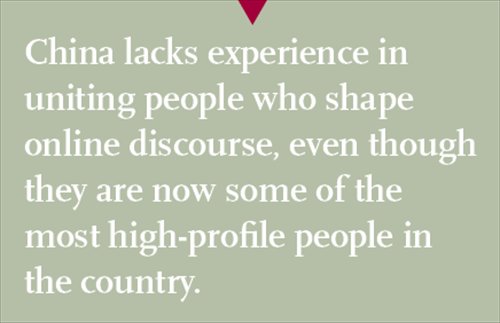Expanding Party’s reach to freelancers, new media workers is proving challenging
The United Front Work Department recently set up a new bureau to reach out to China's "new social stratum" including new media professionals, freelancers and other non-Party intellectuals in an effort to connect with the country's rapidly changing society. Experts say this won't be an easy task, as these people are scattered, don't work for a single organization and are more open to non-mainstream values.

Show hosts broadcast live on their smartphones during a cultural festival held in Zhumadian, Central China's Henan Province. Photo: IC
On July 4, a new central Communist Party of China (CPC) bureau, Bureau No.8, was established under the United Front Work Department (UFWD) of the CPC Central Committee. Also called the "bureau managing the work of the new social stratum," its major responsibility is to foster Party representation among groups that have emerged in the last few years - including those who work in new media.
Established during the Chinese Civil War (1946-49), the CPC initially set up the UFWD to connect with potential allies outside the Party, including other political organizations, intellectuals, religious groups, ethnic minorities and overseas Chinese. After the CPC became the ruling party, the importance of the UFWD dwindled. But President Xi Jinping's emphasis on the leading role of the Party in society and recent changes made to the department show that the CPC is refocusing on this old field.
The CPC uses a variety of means to create links between itself and groups that are not formally affiliated with the Party, including mobilizing them through meetings, inviting non-Party talents to advise the Party on public policy issues, mediating between different groups when conflicts occur and attracting overseas Chinese investments as a way to boost international cooperation.
According to the Party's definition, the new social stratum consists of four types of non-CPC elites, namely managerial and technological staff at private and foreign companies, those who work at social organizations, freelancers and those who work in new media.
Changing definition
As Chinese society has evolved over the years, the definition of "the new social stratum" has also gone through many changes. In 1991, when the CPC first began using the phrase "new social stratum," the term mainly referred to people in the private sector, such as foreign-invested enterprises, self-employed individuals, household firms and private companies.
It was a time when this sector was growing rapidly. By 1990, the total registered capital of private enterprises which were established after the reform and opening-up accounted for 9.5 billion yuan, with 1.48 million employees. The registered capital of commercial household firms accounted for 39.7 billion yuan, involving over 20 million people. These people had become a rising force in China's society.
Back when the People's Republic had just been established, capitalist industrial and commercial enterprises were to be "utilized, restricted and reformed." But after reform and opening-up began in the late 1970s, the guideline for dealing with the private sector became to "unite, assist, guide and educate," and ensure there were sufficient numbers of Party members in the group.
In 1993, 23 representatives from the private sector, including farmer-turned-entrepreneur Liu Yonghao, founder and chairman of the New Hope Group, became members of the National Committee of the Chinese People's Political Consultative Conference. This marked the first time that people from "the new social stratum" entered the political stage.
Along with the private sector of the economy, non-Party intellectuals were then a rising group in society.
But a new question emerged - how to define and understand these new social groups. Are they a new social class? If yes, are they the new capitalists? Academics started to debate this question. Some thought owners of private companies are China's new capitalists, and are by nature the same as old capitalists and therefore incompatible with the country's socialist system.
The conclusion came in July 2001, during a speech given by then President Jiang Zemin. He said that since the reform and opening-up, the components of China's social strata had gone though new changes. "[These new social groups] are also the constructors of socialism with Chinese characteristics," Jiang said during the speech.
Lu Lu, a PhD student majoring in united front work at Shandong University, told the Southern Weekly that this helped to define these people both socially and politically. This means they are not a new class, but "a new social stratum." They would no longer be regarded as capitalists, and therefore threats to China's system.
The definition of "the new social stratum" has continued to change in recent years. In 2015, the CPC issued its first guideline on united front work. According to the guideline, while uniting the private sector under the Party's ideological leadership is still on the CPC's agenda, it no longer falls under the category of "the new social stratum," and now new media representatives will become the new focus of the UFWD, as well as being an emerging group in the "new social stratum."

Growing difficulties
New media practitioners are the latest addition to the "new social stratum."
The Internet started to become a key area of interest for the UFWD after 2000, as the influence of the Internet on Chinese society started to grow. Chen Xiqing, former deputy head of the UFWD, created the concept of "Internet United Front Work" in 2005. In 2012, the department established a team to research the idea. In March 2015, the UFWD gave training to managers at famous Internet companies for the first time, including Chen Tong, vice president of Xiaomi, an electronics company that sells all its products online.
"They need to explore ways to spread positive energy and in the meantime maintain their influence," Li Xiaoning, professor at the Central Institute of Socialism, told the Southern Weekly. He added that China lacks experience in uniting people who shape online discourse, even though they are now some of the most high-profile people in the country.
Lu, however, said "the big Vs," or online opinion leaders, don't necessarily belong to the new social stratum. She said the government's definition of new media practitioners "mainly refers to the owners and employees of Internet companies, rather than just people that are popular online." Whether these opinion leaders belong to the new social stratum will depend on their occupations. Some are already Party members, meaning they are not now being targeted.
The CPC has faced difficulty in expanding its united front work to these new groups. One difficulty is that freelancers are scattered and don't work for a single company or organization, and it's difficult to "unite" them through the traditional means of organization such as setting up Party committees in companies.
Li recalls researching artists in the 798 Art Zone, an artistic community in Beijing. Not only do they not have one organization that they all work for, many of them have a flexible daily schedule that differs from the typical 9-to-5 workday. "They were cooperative enough to be willing to meet us at noon," he said.
Another difficulty in modern united front work is that, as the Internet makes information more available, many people have views which differ from the Party line. With China's increasingly diverse society, coordinating the public to follow one set of values is more challenging than ever. "Traditional means of united front work no longer apply today," Li said.
Establishing organizations
One way to unite people is to establish more Party committees. "From a broader perspective, expanding Party organizations is an effective method," Zhen Xiaoying, former vice director at the Central Institute of Socialism, told the Southern Weekly.
Zhen said more and more private enterprises and social organizations, including law firms, have been asked to establish Party committees.
The Beijing-based Jingsh Law Firm, the biggest law firm in Beijing, for example, established its CPC committee in September 2015 after it was asked to do so by the Party committee of Chaoyang district's Lawyers' Association. Each month, Party secretaries at law firms in Chaoyang district meet up at the Party committee of the Lawyers' Association and discuss their Party work.
Song Xiaojiang, the Party secretary of Jingsh, said that as a law firm with over 800 lawyers and 150 Party members, "if a problem occurs here, it would be a big problem." Song said law firms have incentives to establish Party committees because government departments and State-owned companies are more likely to hire firms that have a Party committee.
Creating more links with the CPC is increasingly no longer the job of one united front department, but is a task that has been given to all of Chinese society. The All-China Federation Of Industry & Commerce, for example, will be in charge of establishing Party organizations in the private sector. And on July 11, the Ministry of Civil Affairs organized a meeting, calling for all social organizations registered with the Ministry of Civil Affairs to establish Party organizations.
Li said China's current emphasis on united front work is an important way to strengthen the Party's ruling foundation and its influence on society. "During [the civil] war, united front work used to be a highly important matter. After the CPC became the ruling Party, however, some Party officials no longer regarded united front work as important. In some lower level organizations, it is even ignored," Li said.
To stress its importance, the CPC has also made it a rule that the head of the UFWD has to be a member of the Standing Committee of the Political Bureau of CPC Central Committee, China's highest-level political body.
Newspaper headline: United we stand